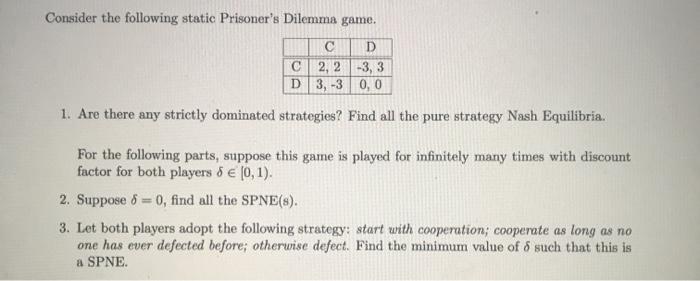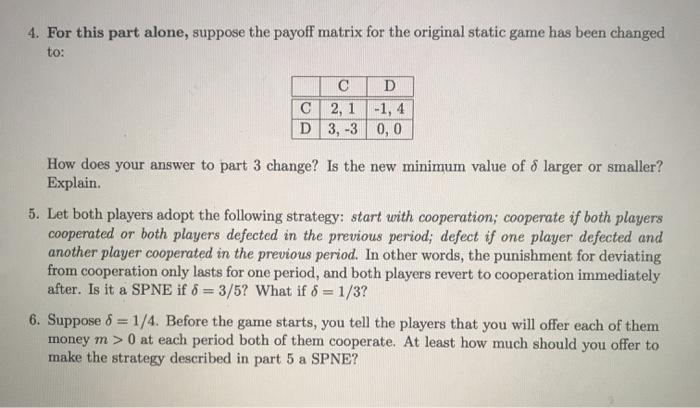Consider the following static Prisoner's Dilemma game. D C2, 2-3, 3 D3, -3 0,0 1. Are there any strictly dominated strategies? Find all the pure strategy Nash Equilibria. For the following parts, suppose this game is played for infinitely many times with discount factor for both players 8 (0,1). 2. Suppose 8 = 0, find all the SPNE(s). 3. Let both players adopt the following strategy: start with cooperation; cooperate as long as no one has ever defected before; otherwise defect. Find the minimum value of 8 such that this is a SPNE 4. For this part alone, suppose the payoff matrix for the original static game has been changed to: D C 2,1 -1,4 D 3, -3 0,0 How does your answer to part 3 change? Is the new minimum value of 8 larger or smaller? Explain. 5. Let both players adopt the following strategy: start with cooperation; cooperate if both players cooperated or both players defected in the previous period; defect if one player defected and another player cooperated in the previous period. In other words, the punishment for deviating from cooperation only lasts for one period, and both players revert to cooperation immediately after. Is it a SPNE if 8 = 3/5? What if 8 = 1/3? 6. Suppose 8 = 1/4. Before the game starts, you tell the players that you will offer each of them money m >0 at each period both of them cooperate. At least how much should you offer to make the strategy described in part 5 a SPNE? Consider the following static Prisoner's Dilemma game. D C2, 2-3, 3 D3, -3 0,0 1. Are there any strictly dominated strategies? Find all the pure strategy Nash Equilibria. For the following parts, suppose this game is played for infinitely many times with discount factor for both players 8 (0,1). 2. Suppose 8 = 0, find all the SPNE(s). 3. Let both players adopt the following strategy: start with cooperation; cooperate as long as no one has ever defected before; otherwise defect. Find the minimum value of 8 such that this is a SPNE 4. For this part alone, suppose the payoff matrix for the original static game has been changed to: D C 2,1 -1,4 D 3, -3 0,0 How does your answer to part 3 change? Is the new minimum value of 8 larger or smaller? Explain. 5. Let both players adopt the following strategy: start with cooperation; cooperate if both players cooperated or both players defected in the previous period; defect if one player defected and another player cooperated in the previous period. In other words, the punishment for deviating from cooperation only lasts for one period, and both players revert to cooperation immediately after. Is it a SPNE if 8 = 3/5? What if 8 = 1/3? 6. Suppose 8 = 1/4. Before the game starts, you tell the players that you will offer each of them money m >0 at each period both of them cooperate. At least how much should you offer to make the strategy described in part 5 a SPNE








